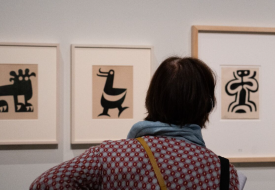In small, intimate groups, our most vulnerable visitors are given time to connect with art and share their emotions. The groups are diverse: some participants are in medical treatment, others are recovering from mental health challenges or living with a disability. The focus lies less on the art itself and more on the experience. Participants sometimes draw or write, but the emphasis is always on creating a safe, calm atmosphere. Kindness is the guiding principle.
The relax visits are loosely inspired by the concept of Slow Art Day and are led by guides trained to gently encourage open conversation. Small group sizes, a warm welcome, and practical care — such as folding chairs for those who cannot stand for long — ensure that everyone feels comfortable. Each session is adapted to the group’s needs, including duration and pace.
Visitors are referred through medical and paramedical partners, and each visit takes time to focus on a select number of artworks, allowing for shared reflection and personal connection. For many, these sessions provide a true moment of breathing space amid a challenging daily routine.
In addition, the Art on Prescription project allows doctors to prescribe tickets for an exhibition visit, an initiative of the City of Brussels. Art as medicine, once again.
With the extension of the CARE project, Bozar continues to make art accessible to anyone who benefits from a gentle, caring environment.
Until 2027, ‘CARE – Culture for Mental Health’ is funded by the Creative Europe programme of the European Union and brings together expertise from across Europe to explore the intersection of art, culture, and mental health for a healthier future. Active in five countries, CARE will directly engage more than 1,500 people in participatory art activities, train over 600 professionals, and raise awareness among an estimated one million people. Funded by the European Union. However, the views and opinions expressed are those of the author(s) only and do not necessarily reflect those of the European Union or the European Education and Culture Executive Agency (EACEA). Neither the European Union nor EACEA can be held responsible for them.

